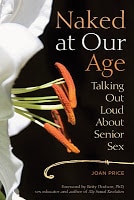When Penetration Hurts: Vulvar and Vaginal Pain
One of the most helpful chapters in Naked at Our Age (coming June 2011) addresses vulvar/vaginal pain, a complex issue. You’ll read real-people stories from women whose vaginal or vulvar pain prevented them from enjoying penetration, or who learned how to renew their vaginal health, plus information and direction for getting your own pain diagnosed and treated. Although you’ll have to wait for the book, until then, these posts about vaginal/vulvar pain will be helpful, and here is a list of websites that offer more information and/or referrals to knowledgeable professionals:
• American Association of Sexuality Educators, Counselors, and Therapists: http://www.aasect.org/.
• American Physical Therapist Association, Section on Women’s Health: http://www.womenshealthapta.org/.
• American Urogynecologic Society: http://www.augs.org/.
• International Society for the Study of Vulvar Disease: http://www.issvd.org/.
• Mypelvichealth.org: http://www.mypelvichealth.org/
• National Vulvodynia Association: http://www.nva.org/
• OObgyn.net: http://www.obgyn.net/
• Pelvic and Sexual Health Institute: http://www.pelvicandsexualhealthinstitute.org/
• Secret Suffering: Helping Women Cope with Sexual and Pelvic Pain (patient site): http://www.secretsuffering.com/.
• Vulval Pain Society: http://www.vulvalpainsociety.org/.
• Vulvar Pain Foundation: http://www.thevpfoundation.org/
• Vulvodynia.com: http://www.vulvodynia.com/
No sex, and we can’t talk about it
Love and intimacy in old age…
“My wife and I are in our fifties and rarely have sex, about once or twice a year,” John wrote to me. “I cannot talk to my wife about it at all, as I suspect she is not interested.” Here is his story of looking for love and intimacy in old age:
Because she never initiates anything I am assuming that she can live without sex. We once went five years of abstinence. This is really a problem for me as I need sex much more frequently. When sex occurs it is not great anyway, following the same pattern each time.
Since menopause my wife finds intercourse painful. Is this just because it’s been a long time since we had sex and the menopause has really kicked in? She never used to find it painful, but I noticed that she does not seem to become aroused much and vaginal fluid has become a thing of the past. Gel did not work either.
John went on to explain that he masturbates a couple of times a week to “fend off the urges that could lead to infidelity,” but he worries that this is harmful and he’s trying to stop. He admits that their sex life in earlier times wasn’t terrific, either — lights off, no variety — but they lived with it for the thirty years of their marriage. He continued:
I have racked my brain for a plan of action. I know the hard part is putting it across to my wife in a way which is pleasant and attractive. So my first move is to stop masturbating to stop the urge. I think that if I leave things until I get really desperate, I will have to communicate with her as the only option.
John’s story tugs at so many important concerns: lack of communication and his wife’s vaginal pain, lack of lubrication, and diminished desire. In my new book, Naked at Our Age: Talking Out Loud about Senior Sex, I devote an entire chapter to each of these four problems. I wish I could send him the book now, but it won’t be out until June. Of course I’m not going to make him wait until June to get some direction. Love and intimacy are important.
First of all, John, your wife needs to get a medical evaluation for her vaginal pain. There can be several causes (which I go into in Naked at Our Age), and yes, there are solutions! A common cause is the tightening of the vaginal floor muscles after menopause when they don’t get regular practice relaxing through sexual arousal and orgasm. An excellent resource for making vaginal intercourse more comfortable is the Vaginal Renewal Program from A Woman’s Touch.
Please also try different lubricants. I don’t know which “gel” you used, but lubricants are very important at our age when our own lubrication decreases.
However, you’ve got to be able to talk about this problem in order to fix it! A sex therapist would be a great help here, especially since this isn’t a new problem. Sex therapists are trained to understand what’s preventing you from having a good sex life and offer strategies for improving communication as well as sex itself. This has gone on so long that although I could offer some communication tips, I think you do need a third person listening. If she wouldn’t be willing to go to a sex therapist, a couples therapist would be a good start.
For now, can you say something like this to your wife?
“Our marriage means the world to me, and I would feel happier if we could work on the problems that are interfering with our sexual intimacy. I think we need some help and guidance, because we’re staying stuck on our own. Could we see a doctor about your vaginal pain and talk to a counselor about how to bring intimacy back into our marriage?”
Please realize, John, that there’s nothing wrong with masturbation at our age or any age. Our sexual urges tell us that we’re fully alive — they’re not our enemy.
I know this is a small answer to a big problem, John, but I hope it will encourage you to take the first steps at talking with your wife openly and lovingly and seeking professional guidance. Would you please let me know what you do and what happens?
“My head knows moving on is best, but….”
“My love for my husband was so great that I am having a very difficult time considering another man,” Jean, age 74, wrote to me. “My head knows moving on is best, but my heart puts up a very good fight. Yes, it gets very lonely at times and then, at other times, I appreciate the solitude. I do believe that at this age, finding someone with whom you are compatible from a distance is best. His and her homes with visitations rights, perks, and genuinely being there for one another sounds like a plan to me! Easy to say and difficult to find!”
Jean’s email came at exactly the moment that I was trying to make sense of similar feelings. I had a “date” with a man with whom I had shared an intensely sensual relationship 27 years ago, when I was 40 and he (get ready) was 23. We had enjoyed each other immensely, then both of us had gone on to other relationships, and he had moved many states away.
Suddenly we discovered that we would be in the same city last Saturday. With anticipation and fantasies abounding, we made arrangements to meet.
How lovely, I daydreamed. Here’s a smart, gentle, witty man from my past, who gloried in giving me pleasure, and we were always able to talk candidly. Surely the 27 years apart could be wiped out for an evening of sensual nostalgia, couldn’t it? I needed to rise from grief and rediscover my sensuality with a live person rather than with sex toys. This sweet man could be the one to take my hand and lead me there.
We met, we hugged, we talked excitedly about where our lives and loves had taken us in the past decades. But then… when the time came to kiss and discover… I couldn’t. I felt myself sinking into sadness. His kiss wasn’t Robert’s. His body type wasn’t Robert’s. I pulled away.
“I really hoped I would respond sexually to you,” I told him, “but I’m not.”
“I’m sorry,” he said, cradling my head against his chest.
“I even packed condoms and lubricant, and chose my underwear with care,” I added. He laughed with me at that last revelation. “But it’s just not happening. I still miss Robert so much.”
“Tell me about him,” he said, maybe the sweetest comment he could have made.
I am grateful to my friend for his understanding, although I didn’t know whether to laugh or cringe when I read “Nostalgia isn’t what it used to be” on his Facebook page early the next day. I decided to laugh and post the comment, “Here’s to nostalgia.”
So when Jean wrote to me just after my friend and I parted, I had to agree with her sentiment, “My head knows moving on is best, but my heart puts up a very good fight.”
A Birthday Without Robert
11/8/2010: Two days from my 67th birthday, and I miss Robert terribly. He always made such a fuss over me on my birthday, cooking me a special meal (vegan mushroom stroganoff and vegan chocolate mousse, for example), writing loving messages in carefully chosen cards, and either buying or painting something special for me.
 He painted a wooden cigar box to create a beautiful jewelry box to hold the earrings he delighted in gifting me. He decorated little boxes for me. He was moved by a story I wrote and painted a folder to hold it. He even decorated a cane when I was injured and couldn’t walk unassisted.
He painted a wooden cigar box to create a beautiful jewelry box to hold the earrings he delighted in gifting me. He decorated little boxes for me. He was moved by a story I wrote and painted a folder to hold it. He even decorated a cane when I was injured and couldn’t walk unassisted.




